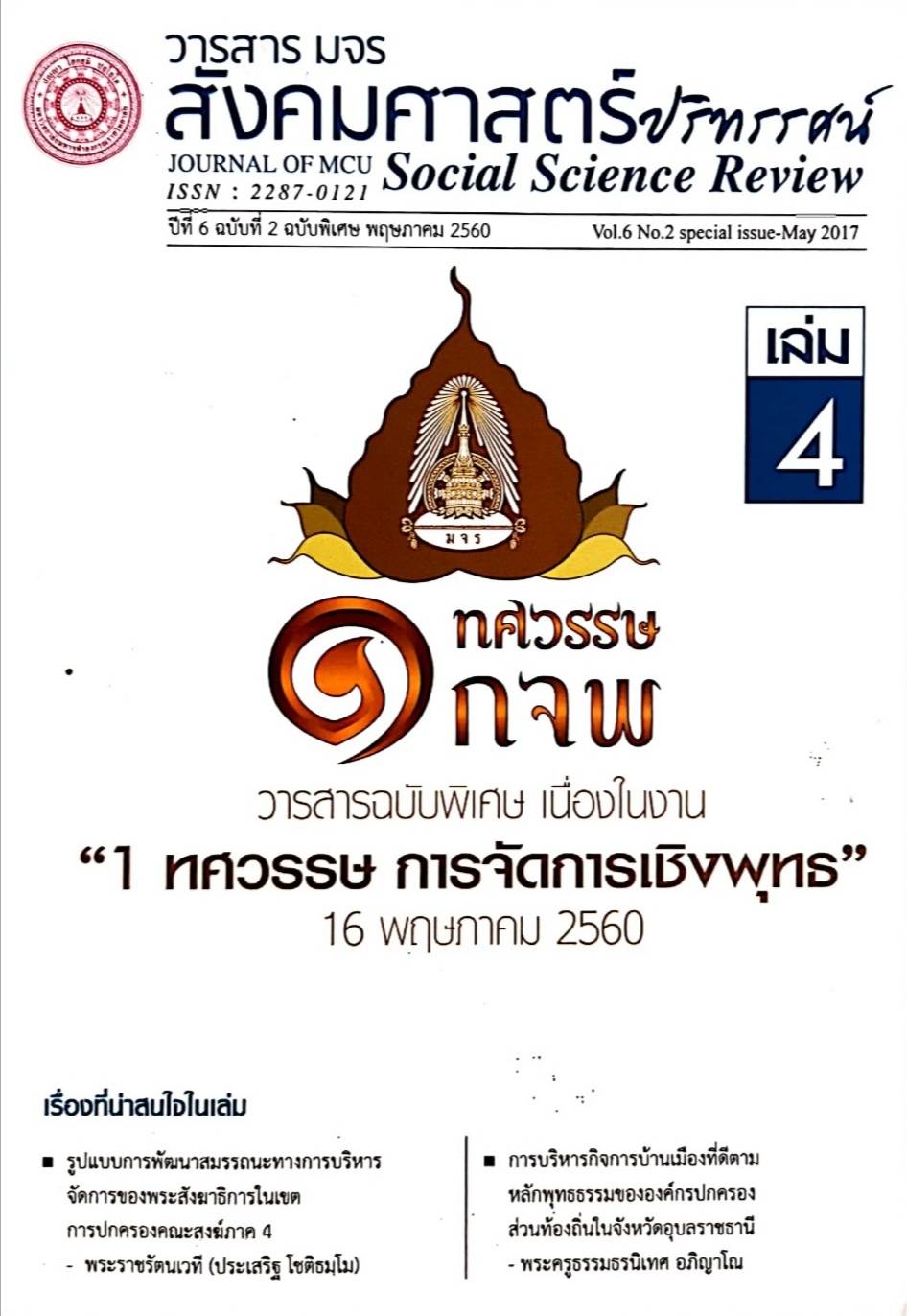การบริหารจัดการชุมชนพึ่งตนเองวิถีพุทธเพื่อความยั่งยืน
คำสำคัญ:
การบริหารจัดการ, ชุมชนพึ่งตนเอง, วิถีพุทธ, ความยั่งยืนบทคัดย่อ
บทความวิจัยนี้มีวัตถุประสงค์เพื่อ 1. ศึกษากลไกการทางานขององค์กรทางสังคมในการ
เสริมสร้างความเข้มแข็งของชุมชน ในภาคตะวันออกเฉียงเหนือตอนล่าง 2. ศึกษาองค์ประกอบของ
การบริหารจัดการชุมชนพึ่งตนเองวิถีพุทธเพื่อความยั่งยืน ในภาคตะวันออกเฉียงเหนือตอนล่าง และ
3. นาเสนอการบริหารจัดการชุมชนพึ่งตนเองวิถีพุทธเพื่อความยั่งยืน
ระเบียบวิธีวิจัยเป็นเชิงคุณภาพ เก็บรวบรวมข้อมูลภาคสนามโดยใช้เทคนิคการสัมภาษณ์
เชิงลึก ใช้วิธีการเลือกผู้ให้ข้อมูลหลักแบบเจาะจง โดยกาหนดจากบุคคลที่เป็นตัวแทนผู้มีส่วนได้ส่วน
เสียทั้งในภาคประชาชน กลุ่ม/องค์กรต่างๆ ภายในชุมชน นักวิชาการภาครัฐด้านการพัฒนาชุมชน
รวมถึงนักวิชาการด้านพระพุทธศาสนา/พระสงฆ์นักพัฒนา จานวน 30 รูป/คน และการสนทนากลุ่ม
เฉพาะ เพื่อรับฟังความคิดเห็น ข้อเสนอแนะ หาลักษณะร่วม โดยกาหนดเลือกบุคคลที่เป็นผู้มีความ
เชี่ยวชาญด้านการพัฒนา และการบริหารจัดการชุมชนให้เข้มแข็ง จานวน 12 รูป/คน วิเคราะห์
ข้อมูลจากทั้งสองขั้นตอนโดยใช้เทคนิคการวิเคราะห์เนื้อหาประกอบบริบท และตรวจสอบความ
สมบูรณ์ของข้อมูลโดยใช้เทคนิคสามเส้า
ผลการวิจัย พบว่า:
1. กลไกหลักที่สาคัญในการขับเคลื่อนการทางานขององค์กรทางสังคมในการเสริมสร้าง
ความเข้มแข็งของชุมชน ในภาคตะวันออกเฉียงเหนือตอนล่าง เพื่อให้ชุมชนสามารถพึ่งตนเองได้
ประกอบด้วย ปัจจัยสาคัญ 4 ด้าน คือ 1) ผู้นาชุมชนและทีมงาน 2) กระบวนการมีส่วนร่วมของ
ประชาชนในชุมชน 3) กระบวนการวางแผนชุมชน และ 4) ผลสาเร็จจากการดาเนินงานของชุมชน
ตามหลักปรัชญาของเศรษฐกิจพอเพียง
2. องค์ประกอบของการบริหารจัดการชุมชนพึ่งตนเองวิถีพุทธเพื่อความยั่งยืน ในภาค
ตะวันออกเฉียงเหนือตอนล่าง ชุมชนได้มีการบริหารจัดการตามหลัก 6M’s คือ 1) การบริหาร
จัดการ (Management) 2) การบริหารจัดการด้านเครื่องมือ/เครื่องจักร (Machine) 3) การบริหาร
จัดการด้านเงินทุน/งบประมาณ (Money) 4) การบริหารจัดการด้านคุณธรรม จริยธรรม (Morality)
5) การบริหารจัดการด้านวัสดุ/วัตถุดิบ (Material) และ 6) การบริหารจัดการด้านคน(Man) และ
ได้มีการนาหลักนาถกรณธรรม 10 มาบูรณาการใช้ให้เหมาะสมกันในแต่ละด้าน ประกอบด้วย 1) ศีล
2) พาหุสัจจะ 3) กัลยาณมิตตตา 4) โสวจัสสตา 5) กิงกรณีเยสุ ทักขตา 6) ธรรมกามตา 7) วิริ
ยารัมภะ 8) สันตุฏฐี 9) สติ และ 10) ปัญญา
3. การบริหารจัดการชุมชนพึ่งตนเองวิถีพุทธเพื่อความยั่งยืน คือ ผู้นาชุมชน ทีมงาน และ
สมาชิกในชุมชนได้มีการบริหารจัดการชุมชนให้สามารถพึ่งตนเองได้อย่างยั่งยืน ภายใต้หลักปรัชญา
ของเศรษฐกิจพอเพียงและวิถีพุทธ โดยมุ่งเน้นถึงผลลัพธ์ที่ดีของแนวทางการบริหารจัดการชุมชน
โดยใช้กรอบแนวทาง “5E-1P” คือ 5E อันประกอบด้วย 1) การเรียนรู้ (Education) 2) สภาพ
สิ่งแวดล้อม (Environment) 3) ประสิทธิภาพ (Efficiency) 4) ประสิทธิผล (Effectiveness) และ
5) เศรษฐกิจ (Economy) และ 1P คือ ความสันติสุข (Peace) ซึ่งมีการพัฒนาตนเองโดยผ่านการ
แลกเปลี่ยนเรียนรู้ให้สอดคล้องกับสภาพสิ่งแวดล้อมบริบทชุมชนของตนเอง ด้วยการมุ่งเน้นทั้ง
ประสิทธิภาพและประสิทธิผลที่จะทาให้เกิดภายในชุมชน อันเป็นจุดหมายปลายทางที่ทุกคนใน
ชุมชนพึงประสงค์
เอกสารอ้างอิง
ประจาชาติ. พิมพ์ครั้งที่ 18. กรุงเทพมหานคร: บริษัท สหธรรมิก จากัด.
มหาจุฬาลงกรณราชวิทยาลัย. (2535). พระไตรปิฎกภาษาบาลี ฉบับมหาจุฬาเตปิฏก 2500.
กรุงเทพมหานคร : โรงพิมพ์มหาจุฬาลงกรณราชวิทยาลัย.
. (2539). พระไตรปิฎกภาษาไทย ฉบับมหาจุฬาลงกรณราชวิทยาลัย. กรุงเทพมหานคร :
โรงพิมพ์มหาจุฬาลงกรณราชวิทยาลัย.
วิฑูรย์ สิมะโชคดี. (2545). การพัฒนาทรพยากรมนุษย์. กรุงเทพมหานคร: เนตรนิมิตการพิมพ์.
วิรัช วิรัชนิภาวรรณ. (2552). แนวคิดทางรัฐประศาสนศาสตร์การประยุกต์และการพัฒนา.
กรุงเทพมหานคร: สายส่งรวมเพื่อน บริษัทก้าวใหม่.
ศรีศักร วัลลิโภดม. (2554). พัฒนาการทางสังคม-วัฒนธรรมไทย. พิมพ์ครั้งที่ 1. กรุงเทพมหานคร:
เมืองโบราณ.
ศุภชัย เจริญวงศ์. (2544). ถอดรหัสการพัฒนา. กรุงเทพมหานคร: โรงพิมพ์เดือนตุลา.
สรรเสริญ วงศ์ชอุ่ม. (2554). การวางแผนพัฒนาประเทศ. พิมพ์ครั้งที่ 1. นนทบุรี: บริษัท ศูนย์การ
พิมพ์เพชรรุ่ง จากัด.
สัญญา สัญญาวิวัฒน์. (2542). การพัฒนาชุมชนแบบจัดการ. กรุงเทพมหานคร: หจก. เอมีเทรดดิ้ง.
สานักงานคณะกรรมการพัฒนาการเศรษฐกิจและสังคมแห่งชาติ. (2554). แผนพัฒนาเศรษฐกิจและ
สังคมแห่งชาติ ฉบับที่สิบเอ็ด พ.ศ. 2555-2559. กรุงเทพมหานคร: สานักนายกรัฐมนตรี.
วิทยา จันทร์แดง. (2554). “การพัฒนารูปแบบการบริหารจัดการชุมชนเข้มแข็งตามแนวปรัชญา
เศรษฐกิจพอเพียง ในเขตจังหวัดภาคกลางตอนบน”. วิทยานิพนธ์รัฐประศาสนศาสตร
ดุษฎีบัณฑิต สาขาวิชารัฐประศาสนศาสตร์. บัณฑิตวิทยาลัย: มหาวิทยาลัยราชภัฏวไลย
อลงกรณ์ ในพระบรมราชูปถัมภ์.
อมรรัตน์ ทิพย์เลิศ. (2548). “ความสามารถทางการสื่อสารของผู้นาท้องถิ่นในการบริหารจัดการ
ชุมชน กรณีศึกษา: ชุมชนตาบลบางเจ้าฉ่า อาเภอโพธิ์ทอง จังหวัดอ่างทอง”.
วิทยานิพนธ์ปรัชญาดุษฎีบัณฑิต สาขาวิชาสื่อสารมวลชน. คณะวารสารศาสตร์และ
สื่อสารมวลชน: มหาวิทยาลัยธรรมศาสตร์.
อภิชาติ ใจอารีย์. “กระบวนการมีส่วนร่วมแบบพหุภาคีเพื่อการจัดการสิ่งแวดล้อมอย่างยั่งยืน
กรณีศึกษาการจัดการปุาชุมชนบ้านพุเตย จังหวัดกาญจนบุรี”. รายงานการวิจัย. วารสาร
มหาวิทยาลัยศิลปากร ฉบับภาษาไทย สาขาสังคมศาสตร์ มนุษยศาสตร์ และศิลปะ ปีที่
36 ฉบับที่ 1 (มกราคม-เมษายน พ.ศ. 2559).
Fonchingong, C. & Fonjong, L. “The Concept of Self-Reliance in Community
Disruption Initiatives in the Cameroon Grassfilds”, Geo Journal. 57 (1): 2.
Pugh, Derek. (1985). Writers on Organizations, (Beverly Hills, California: Sage.
ดาวน์โหลด
เผยแพร่แล้ว
รูปแบบการอ้างอิง
ฉบับ
ประเภทบทความ
สัญญาอนุญาต
ลิขสิทธิ์ (c) 2020 วารสาร มจร สังคมศาสตร์ปริทรรศน์

อนุญาตภายใต้เงื่อนไข Creative Commons Attribution-NonCommercial-NoDerivatives 4.0 International License.
เพื่อให้เป็นไปตามกฎหมายลิขสิทธิ์ ผู้นิพนธ์ทุกท่านต้องลงลายมือชื่อในแบบฟอร์มใบมอบลิขสิทธิ์บทความให้แก่วารสารฯ พร้อมกับบทความต้นฉบับที่ได้แก้ไขครั้งสุดท้าย นอกจากนี้ ผู้นิพนธ์ทุกท่านต้องยืนยันว่าบทความต้นฉบับที่ส่งมาตีพิมพ์นั้น ได้ส่งมาตีพิมพ์เฉพาะในวารสาร มจร สังคมศาสตร์ปริทรรศน์ เพียงแห่งเดียวเท่านั้น หากมีการใช้ภาพหรือตารางหรือเนื้อหาอื่นๆ ของผู้นิพนธ์อื่นที่ปรากฏในสิ่งตีพิมพ์อื่นมาแล้ว ผู้นิพนธ์ต้องขออนุญาตเจ้าของลิขสิทธิ์ก่อน พร้อมทั้งแสดงหนังสือที่ได้รับการยินยอมต่อบรรณาธิการ ก่อนที่บทความจะได้รับการตีพิมพ์ หากไม่เป็นไปตามข้อกำหนดเบื้องต้น ทางวารสารจะถอดบทความของท่านออกโดยไม่มีข้อยกเว้นใดๆ ทั้งสิ้น





